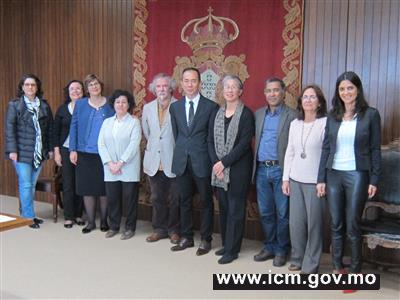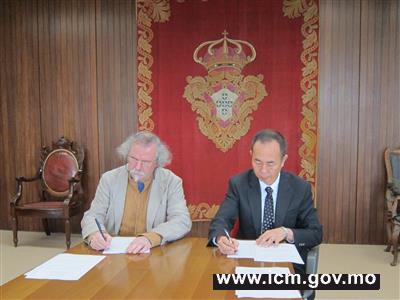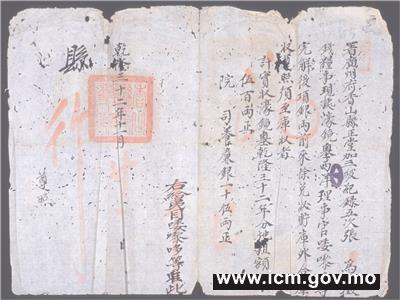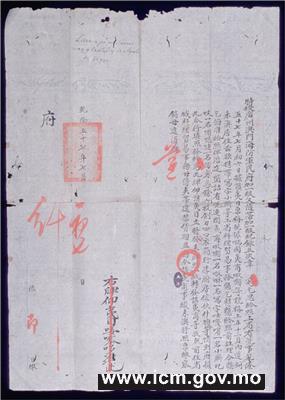Date : 30/10/2015
A memorandum of understanding for cooperation in archival domain was signed between the Cultural Affairs Bureau of the Macao Special Administrative Region and the General Directorate for Book, Archives and Libraries of Portugal. The signing ceremony, which took place in the National Archives of Portugal on 20 October 2015, was attended by Mr Ung Vai Meng, President of the Cultural Affairs Bureau of Macao, Ms Andrea Direito, Advisor of the Office of the Secretary for Social Affairs and Culture of Macao, Ms Lau Fong, Director of the Historical Archives of Macao, Mr Silvestre de Almeida Lacerda, General Director for Book, Archives and Libraries of Portugal and Ms Cristina Faustino, representative of Camões Mission – Institute for Cooperation and Language of Portugal.
The memorandum of understanding is instrumental to the promotion of cooperation between the two parties in areas including the joint nomination of "Chapas Sínicas" to the UNESCO Memory of the World Register, exchanges between archivists from the two regions and trainings in the archival profession.
“Chapas Sínicas” is a collection of official records of Macao during the Qing Dynasty (1693-1886) preserved in the National Archives of Portugal (also known as The National Archive of Torre do Tombo). The collection comprises over 3,600 documents, including over 1,500 official letters written in Chinese, 5 books of Portuguese translated copies of the letters kept by the Loyal Senate of Macao and 4 packets of miscellaneous documents. The collection of “Chapas Sínicas” is made up of official and non-official documents created mainly from the mid-eighteenth century to the mid-nineteenth century, namely from the early years of the reign of Emperor Qianlong (1736-1795) to the late years of the reign of Emperor Daoguang (1821-1850); Nevertheless, there are also some documents from the early years of the reign of Emperor Guangxu (1875-1908). A major part of the collection are official correspondence exchanged between the sub-prefects of Macao, magistrates of Xiangshan and other Chinese officials and the Procurators of the Loyal Senate of Macao during the exercise of Chinese sovereignty over Macao. From the perspective of provenance, the collection is records of local authorities in the Qing Dynasty.
Part of the records was official correspondence between the Chinese and Portuguese authorities under the special circumstances when Macao was leased to Portugal. They contain terms and limitations that were established for the Portuguese scope of administration in Macao, which manifests the territorial and jurisdictional sovereignty of China over Macao. The records cover a wide spectrum of topics including district administration, finance and taxation, justice and jurisdiction, land and population, customs and excise, debt disputes, sino-foreign negotiations, shipwreck rescue, piracy combat efforts, overseeing of Christian missionaries, prohibition of opium commerce and many others. There are also reports and petitions submitted by the Portuguese authorities based in Macao and the replies received from the Chinese authorities in Guangdong. In addition, some records reflect the social conditions of the society, the people's lives, urban development, industrial and agricultural production, trade and commerce, tax and duties, goods and money transactions between Macao and commercial firms called "hongs" authorised by the Qing court as sole agents of external trade (collectively known as "the Thirteen Hongs of Canton"), as well as the economic ties between Macao and different provinces of China, the coexistence of eastern and western cultures and the disputes arose therefrom, marine traffic between Macao and other Chinese and foreign counterparts, and the external trade of Macao, etc. These records, consisting of accounts, letters, deeds, contracts and other documents, contain first-hand information of great value.
In 1989, the Historical Archives of Macao recovered the collection of Chinese records from the National Archives of Portugal in microfilm format and began its cataloguing in the following year. The catalogue of "Chapas Sínicas" was published in Chinese and Portuguese versions in 1997. The Chinese manuscripts and their translation copies in Portuguese were compiled and published by the Macao Foundation in 1999 and 2000.
At the signing ceremony of the memorandum of understanding, Mr Ung Vai Meng, President of the Cultural Affairs Bureau, remarked that "memory of the world" is a documented collective memory of people of the world, it is the world's documentary heritage and a significant component of the world's cultural heritage. The aim of Memory of the World Programme is to ensure the world's documentary heritage is preserved and promoted. It was envisaged that the joint nomination of "Chapas Sínicas" could further promote the cooperation between the Archives of Macao and Portugal on the conservation and digitization of the collection. He also announced that an exhibition on "Chapas Sínicas" and a series of related lecturers were scheduled to be held in Macao and Portugal in 2018. In closing, Mr Ung expressed his gratitude to the National Archives of Portugal for providing Macao’s documentation in its holding and putting forward the idea of nominating with the Historical Archives of Macao of “Chapas Sínicas” to the UNESCO Memory of the World Register, which was a manifestation of the cultural value that Macao possesses and a contribution to the cultural exchanges between China and Portugal.



